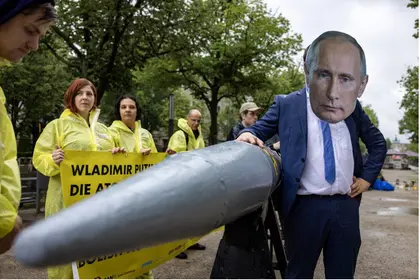Russian President Vladimir Putin has instructed the country's military to conduct nuclear weapons exercises involving the navy and troops stationed near Ukraine, the defense ministry announced on Monday, May 6.
The decision comes as Putin has increasingly raised nuclear rhetoric since the beginning of the war in Ukraine. In February, during his national address, he warned of a "real" risk of nuclear war.
JOIN US ON TELEGRAM
Follow our coverage of the war on the @Kyivpost_official.
"During the exercise, various measures will be undertaken to practice the preparation and use of non-strategic nuclear weapons," The defense ministry said in a message on Telegram.
The Kremlin specified that the exercises were a response to statements by French President Emmanuel Macron and British officials, AFP reported.
Russia has in recent days hit out at Macron for telling The Economist magazine he was "not ruling anything out" in the West's response to the war in Ukraine, including sending troops to the country.
Kremlin spokesman Dmitry Peskov said on Monday that the West is provoking an unprecedented round of tension in Ukraine, which requires Russia’s response.
Peskov called Macron’s statements about a possible deployment of troops to Ukraine an unprecedented new round of tension:
“It is necessary to check whether the information about sending French troops to Ukraine is true, the Russian Defense Ministry is dealing with this,” Peskov said.
The Kremlin has also blasted UK Foreign Secretary David Cameron for saying Kyiv has the right to strike targets inside Russia.

EXPLAINED: What We Know About Russia’s Oreshnik Missile Fired on Ukraine
Non-strategic nuclear weapons, also referred to as tactical nuclear weapons, are designed for battlefield use and can be delivered via missiles.
The ministry added that the drills would be conducted "in the near future" and were intended to safeguard Russia's territorial integrity against perceived threats from certain Western officials.
In the first days of the war with Ukraine, Putin announced the transfer of Russian nuclear forces to a “special mode” of combat alert, and six months later he threatened to use “all available means” to protect the occupied territories of Ukraine.
Early last year, Putin announced the termination of Russia’s participation in the Strategic Arms Reduction Treaty with the United States, and a month later he announced the deployment of tactical nuclear weapons in Belarus.
Two months ago, Polish Prime Minister Donald Tusk said the Russian president’s aggressive rhetoric and “announcements” should be taken seriously.
The West should understand that the “arms race” Russia is imposing on the world obliges the West to wake up and prepare militarily for potential threats, Tusk said.
“The European Union has to take decisions that will balance Russia’s military potential and make Europe better prepared for bad scenarios,” he added.
At the end of 2022, the United States began to prepare for a potential Russian nuclear strike on Ukraine carefully, CNN reported earlier, citing unnamed officials from the US administration.
At that time, the nuclear scenario was seen as realistic after a series of defeats by the Russian army, which at that time had surrendered the Kharkiv region and was forced to leave Kherson. The assessment was made based on “extremely sensitive data” obtained by American intelligence.
According to CNN sources, the involvement of China and India, which, in turn, put pressure on Putin, helped prevent the conflict from going nuclear.
You can also highlight the text and press Ctrl + Enter






